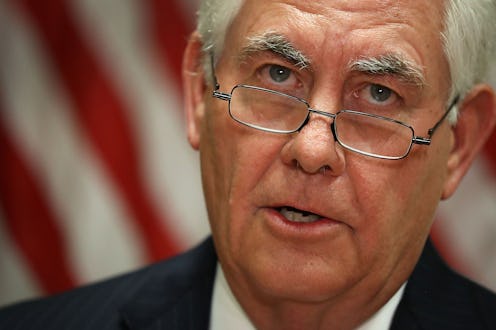
On Thursday, Secretary of State Rex Tillerson said that Syrian President Bashar al-Assad's alleged complicity in using chemical warfare against his citizens means there would be "no role" for him to continue governing and that the United States was deliberating an "appropriate response" to Assad's government. Later that day, the United States military sent dozens of cruise missiles to attack a Syrian air base. It remains to be seen if that means a full-scale and outright war with Syria.
Tillerson's statements came two days after Syrian aircraft reportedly deployed toxic gas in parts of the northwestern Idlib province of Syria. The suspected chemical attacks killed more than 70 people, including at least 16 women and 23 children, according to the Syrian American Medical Society.
The United States government believes that the Assad regime orchestrated the attacks on the town of Khan Sheikhyoun. While speaking with reporters, Tillerson said, "There is no doubt in our minds, and the information we have supports that Syria, the Syrian regime under the leadership of President Bashar al Assad, are responsible for this attack."
His statements echoed Donald Trump's own assessment of the event in Syria. Trump told reporters traveling with him on Air Force One, "I think what Assad did is terrible. I think what happened in Syria is a disgrace to humanity and he's there, and I guess he's running things, so something should happen." That said, Trump has issued no direct statement on a possible direct war with Syria.
Tillerson also demanded that Syria's biggest ally, Russia, evaluate its role in the midst of these events. "It is very important that the Russian government consider carefully their continued support for the Assad regime," he said.
When asked what specific steps will be taken, Tillerson did not provide a clear answer but stated, "The process by which Assad would leave is something that requires an international community effort both to first defeat ISIS within Syria, to stabilize the Syrian country to avoid further civil war and then to work collectively with our partners around the world through a political process that would lead to Assad leaving."
In a response to a question about whether the Trump administration will lead an international coalition against Assad, Tillerson said that "those steps are underway," but he did not specify any particular countries for such a course of action, nor did he specifically state whether America would go to war with Syria.
The Trump administration has pointed to Barack Obama's perceived failure to be tougher on Assad. Press Secretary Sean Spicer said, "These heinous actions by the Bashar Assad regime are a consequence of the past administration’s weakness and irresolution. President Obama said in 2012 that he would establish a ‘red line’ against the use of chemical weapons and then did nothing."
In 2013, Obama condemned the Syrian government's treatment of its own people by calling it an "attack on human dignity" while demanding that "this menace must be confronted." He warned Assad against the usage of chemical weapons against civilians but ultimately took no action since it was feared that direct military engagement with Syria could lead to more radical factions in the country.
This is not the first time Assad's regime has been accused of deploying illegal and indiscriminate weapons against Syrian citizens. Last year, an international team mandated by the United Nations concluded that both the Syrian government and ISIS had conducted chemical attacks in 2014 and 2015. The Assad regime has continued to deny such allegations.
The immediate response from the United States to attack Syria with Tomahawk cruise missiles indicates that the Trump administration is willing to move on Syria — and fast. Whether or not a war will ultimately occur is unclear at the moment.